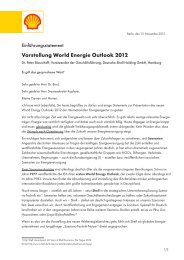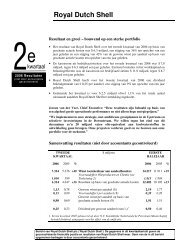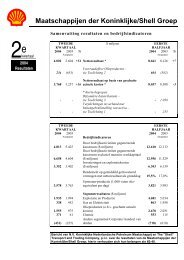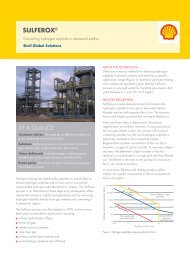62414 sustain 40pp (Mag)
62414 sustain 40pp (Mag)
62414 sustain 40pp (Mag)
Create successful ePaper yourself
Turn your PDF publications into a flip-book with our unique Google optimized e-Paper software.
Climate change<br />
“ For us, as a company, the debate about whether man-made climate change is happening<br />
is over. The debate now is about what we can do about it. Businesses, like ours, need to<br />
turn CO2 management into a business opportunity by leading the search for responsible<br />
ways to manage CO2, and use energy more efficiently. But that also requires concerted<br />
action by governments to create the long-term, market-based policies needed to make it<br />
worthwhile for companies to invest. With fossil fuel use and CO2 levels continuing to<br />
grow fast, there is no time to lose.<br />
Jeroen van der Veer<br />
CHIEF EXECUTIVE<br />
In 2006, concern about man-made climate<br />
change reached new heights (and a possible<br />
tipping point) in many countries. An influential<br />
report for the UK Government by Sir Nicholas<br />
Stern, former chief economist at the World<br />
Bank, highlighted the financial risks for the<br />
global economy of failing to address the climate<br />
change threat. Calling climate change “the<br />
greatest market failure the world has ever seen”,<br />
it appealed for strong, international and coordinated<br />
government policies to encourage<br />
GHG reductions. In early 2007, the scientists<br />
of the United Nations’ Intergovernmental Panel<br />
on Climate Change re-confirmed the scientific<br />
consensus – now with more than 90% certainty<br />
– that man-made climate change is underway.<br />
Shell was one of the first energy companies to<br />
acknowledge the threat of climate change; to<br />
call for action by governments, our industry<br />
and energy users; and to take action ourselves.<br />
In 1998, we set ourselves voluntary targets for<br />
reducing GHG emissions from our operations.<br />
Since then Shell Renewables has built one of<br />
the broadest alternative energy portfolios of any<br />
major energy company. We have increased the<br />
supply of natural gas – the lowest carbon fossil<br />
fuel – and of the lower sulphur transport fuels<br />
needed by more fuel-efficient modern engines.<br />
The expected future costs of emitting CO2<br />
have been included in our investment decisions<br />
since 2000. This helps us design new projects<br />
so that they remain profitable in the carbonconstrained<br />
world that is now emerging.<br />
We are helping by:<br />
”<br />
• Reducing emissions from our operations.<br />
• Improving technology to capture and store CO2 from fossil fuels.<br />
Partnerships are being pursued to develop lower<br />
carbon technologies. Large-scale demonstration<br />
projects to capture and store CO2 are being<br />
given careful consideration. Our retail business<br />
runs a series of public campaigns to encourage<br />
innovation and promote energy conservation.<br />
We stepped up our appeal to governments in<br />
2006, to lead on this issue and introduce<br />
effective policies to combat climate change.<br />
The importance of government leadership has<br />
become clear. Without policies that reward<br />
lower CO2 technologies and create a predictable,<br />
long-term cost for emitting GHGs, individual<br />
companies will have no incentive to make the<br />
massive investments needed.<br />
Our appeal to governments is fourfold: firstly,<br />
to involve all major emitting countries and all<br />
sectors – not just industry – to avoid distorting<br />
competition; secondly, to develop stable, longterm<br />
GHG targets to allow companies to plan<br />
and invest; thirdly, to use emissions trading<br />
systems more widely as a cost-effective way to<br />
manage GHGs from industry and to include<br />
reductions from CO2 capture and storage in<br />
these schemes; and finally, to design bettertargeted<br />
support for alternative energy sources,<br />
to help them reach the point where they can<br />
compete without further subsidies.<br />
• Providing more natural gas, clean coal technology and advanced transport fuels.<br />
• Working to build a substantial business in at least one alternative energy source.<br />
• Calling on governments to introduce the policies needed to manage GHG<br />
emissions reductions.<br />
THE SHELL SUSTAINABILITY REPORT 2006 11


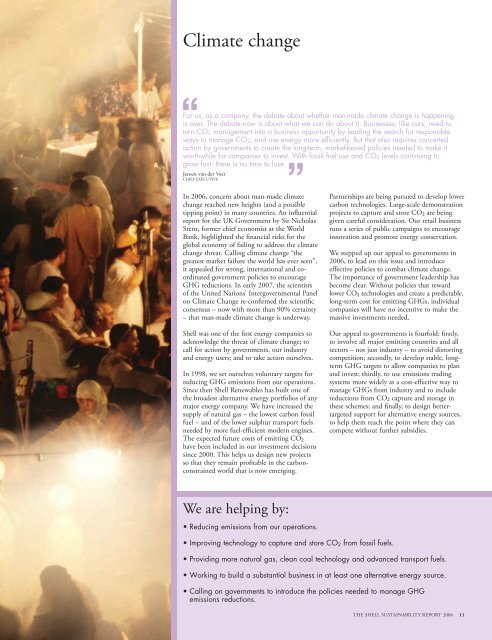


![Download Shell AutoGas Stationen [Stand: Januar 2013] (PDF](https://img.yumpu.com/9982753/1/190x245/download-shell-autogas-stationen-stand-januar-2013-pdf.jpg?quality=85)

